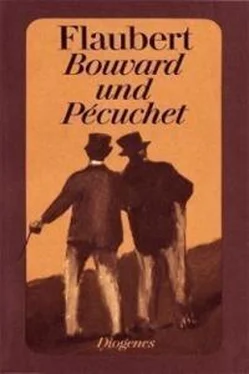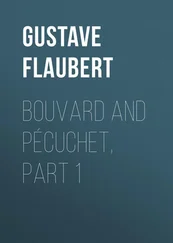At length, on the evening of the third day, they deemed it advisable to assist nature, but the goat, turning round on Pécuchet, hit him in the lower part of the stomach with his horns. The ewe, seized with fear, began turning about in the press as if in a riding–school. Bouvard ran after her, threw himself on top of her to hold her, and fell on the ground with both hands full of wool.
They renewed their experiments on hens and a drake, on a mastiff and a sow, in the hope that monsters might be the result, not understanding anything about the question of species.
This word denotes a group of individuals whose descendants reproduce themselves, but animals classed as of different species may possess the power of reproduction, while others comprised in the same species have lost the capacity. They flattered themselves that they would obtain clear ideas on this subject by studying the development of germs; and Pécuchet wrote to Dumouchel in order to get a microscope.
By turns they put on the glass surface hairs, tobacco, finger–nails, and a fly's claw, but they forgot the drop of water which is indispensable; at other times it was the little lamel, and they pushed each other forward, and put the instrument out of order; then, when they saw only a haze, they blamed the optician. They went so far as to have doubts about the microscope. Perhaps the discoveries that have been attributed to it are not so certain?
Dumouchel, in sending on the invoice to them, begged of them to collect on his account some serpent–stones and sea–urchins, of which he had always been an admirer, and which were commonly found in country districts. In order to interest them in geology he sent them the Lettres of Bertrand with the Discours of Cuvier on the revolutions of the globe.
After the perusal of these two works they imagined the following state of things:
First, an immense sheet of water, from which emerged promontories speckled with lichens, and not one human being, not one sound. It was a world silent, motionless, and bare; there long plants swayed to and fro in a fog that resembled the vapour of a sweating–room. A red sun overheated the humid atmosphere. Then volcanoes burst forth; the igneous rocks sent up mountains of liquid flame, and the paste of the streaming porphyry and basalt began to congeal. Third picture: in shallow seas have sprung up isles of madrepore; a cluster of palm trees overhangs them here and there. There are shells like carriage wheels, tortoises three metres in length, lizards of sixty feet; amphibians stretch out amid the reeds their ostrich necks and crocodile jaws; winged serpents fly about. Finally, on the large continents, huge mammifers make their appearance, their limbs misshapen, like pieces of wood badly squared, their hides thicker than plates of bronze, or else shaggy, thick–lipped, with manes and crooked fangs. Flocks of mammoths browsed on the plains where, since, the Atlantic has been; the paleotherium, half horse, half tapir, overturned with his tumbling the ant–hills of Montmartre; and the cervus giganteus trembled under the chestnut trees at the growls of the bears of the caverns, who made the dog of Beaugency, three times as big as a wolf, yelp in his den.
All these periods had been separated from one another by cataclysms, of which the latest is our Deluge. It was like a drama of fairyland in several acts, with man for apotheosis.
They were astounded when they learned that there existed on stones imprints of dragon–flies and birds' claws; and, having run through one of the Roret manuals, they looked out for fossils.
One afternoon, as they were turning over some flints in the middle of the high–road, the curé passed, and, accosting them in a wheedling tone:
"These gentlemen are busying themselves with geology. Very good."
For he held this science in esteem. It confirmed the authority of the Scriptures by proving the fact of the Deluge.
Bouvard talked about coprolites, which are animals' excrements in a petrified state.
The Abbé Jeufroy appeared surprised at the matter. After all, if it were so, it was a reason the more for wondering at Providence.
Pécuchet confessed that, up to the present, their inquiries had not been fruitful; and yet the environs of Falaise, like all Jurassic soils, should abound in remains of animals.
"I have been told," replied the Abbé Jeufroy, "that the jawbone of an elephant was at one time found at Villers."
However, one of his friends, M. Larsoneur, advocate, member of the bar at Lisieux, and archæologist, would probably supply them with information about it. He had written a history of Port–en–Bessin, in which the discovery of an alligator was noticed.
Bouvard and Pécuchet exchanged glances: the same hope took possession of both; and, in spite of the heat, they remained standing a long time questioning the ecclesiastic, who sheltered himself from the sun under a blue cotton umbrella. The lower part of his face was rather heavy, and his nose was pointed. He was perpetually smiling, or bent his head while he closed his eyelids.
The church–bell rang the Angelus.
"A very good evening, gentlemen! You will allow me, will you not?"
At his suggestion they waited three weeks for Larsoneur's reply. At length it arrived.
The name of the man who had dug up the tooth of the mastodon was Louis Bloche. Details were wanting. As to his history, it was comprised in one of the volumes of the Lisieux Academy, and he could not lend his own copy, as he was afraid of spoiling the collection. With regard to the alligator, it had been discovered in the month of November, 1825, under the cliff of the Hachettes of Sainte–Honorine, near Port–en–Bessin, in the arrondissement of Bayeux. His compliments followed.
The obscurity that enshrouded the mastodon provoked in Pécuchet's mind a longing to search for it. He would fain have gone to Villers forthwith.
Bouvard objected that, to save themselves a possibly useless and certainly expensive journey, it would be desirable to make inquiries. So they wrote a letter to the mayor of the district, in which they asked him what had become of one Louis Bloche. On the assumption of his death, his descendants or collateral relations might be able to enlighten them as to his precious discovery, when he made it, and in what public place in the township this testimony of primitive times was deposited? Were there any prospects of finding similar ones? What was the cost of a man and a car for a day?
And vainly did they make application to the deputy–mayor, and then to the first municipal councillor. They received no news from Villers. No doubt the inhabitants were jealous about their fossils—unless they had sold them to the English. The journey to the Hachettes was determined upon.
Bouvard and Pécuchet took the public conveyance from Falaise to Caen. Then a covered car brought them from Caen to Bayeux; from Bayeux, they walked to Port–en–Bessin.
They had not been deceived. There were curious stones alongside the Hachettes; and, assisted by the directions of the innkeeper, they succeeded in reaching the strand.
The tide was low. It exposed to view all its shingles, with a prairie of sea–wrack as far as the edge of the waves. Grassy slopes cut the cliff, which was composed of soft brown earth that had hardened and become in its lower strata a rampart of greyish stone. Tiny streams of water kept flowing down incessantly, while in the distance the sea rumbled. It seemed sometimes to suspend its throbbing, and then the only sound heard was the murmur of the little springs.
They staggered over the sticky soil, or rather they had to jump over holes.
Bouvard sat down on a mound overlooking the sea and contemplated the waves, thinking of nothing, fascinated, inert. Pécuchet brought him over to the side of the cliff to show him a serpent–stone incrusted in the rock, like a diamond in its gangue. It broke their nails; they would require instruments; besides, night was coming on. The sky was empurpled towards the west, and the entire sea–shore was wrapped in shadow. In the midst of the blackish wrack the pools of water were growing wider. The sea was coming towards them. It was time to go back.
Читать дальше








![Гюстав Флобер - Закат Карфагена [Сборник]](/books/414440/gyustav-flober-zakat-karfagena-sbornik-thumb.webp)


